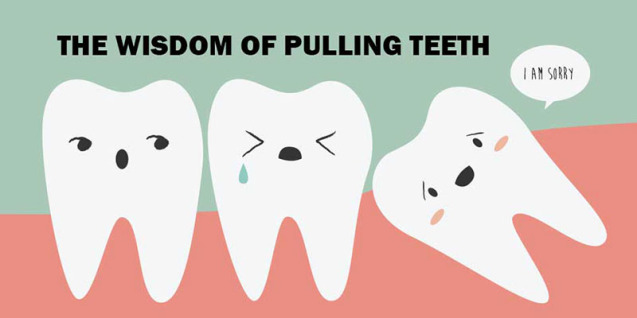Getting your wisdom teeth removed often causes a lot of anxiety to the average dental patient. The idea of having teeth pulled, and spending the following days looking like a chipmunk, with your cheeks swollen, often sends patients running. This will generally delay the appointment until the patient returns in pain or infected.
Before you make a decision on ‘To Remove or Not to Remove’ there are a few things you should be aware of.
In our office, we do not find it necessary to remove the wisdom teeth if they are;
-Healthy (without decay or infection)
-Fully erupted.(completely grown above the gums)
-Vertically positioned.
-Properly cleaned and cared for as part of your daily oral hygiene routine.
Since wisdom teeth are your 3rd molars, they grow in the back of your mouth and sometimes get impacted in the jaw. This depends on the angle in which they are erupting and whether or not you have any room for them in your jaw. Also, wisdom teeth are unlike any other teeth in your mouth and do not have a particular shape or size. Some dentists encourage young patients, as early as 15 years of age, to remove these teeth if they are visibly growing in crooked because they are easier to remove in the early years when the root has not fully formed.
We encourage removal of your wisdom teeth if they are;
-Only partially erupted and partially submerged under the gums. This creates a food trap and may cause decay on the exposed tip or on the adjacent tooth. It may also cause Pericoronitis, a bacterial infection resulting in swelling, redness and oozing of the tissue around the erupting tooth.
-Clearly erupting at an angle. This may damage adjacent teeth and it may not ever erupt through the gums.
– Developing a cyst around the unerupted tooth which may cause damage to surrounding tissue or bone.
– Severely decayed or causing you pain.
By knowing this, you can decide with your dentist if removal of your wisdom teeth is necessary. These extractions are often done with an oral surgeon who is specialized in surgical dental extractions. Medication may be given to help ease anxiety before the appointment or you may ask to be sedated (‘go to sleep’) so you do not experience the actual procedure. When you wake up, the teeth are out and you are given post operative instructions and, in some cases, pain medication to manage any discomfort in the following days. This makes the experience so much easier!

